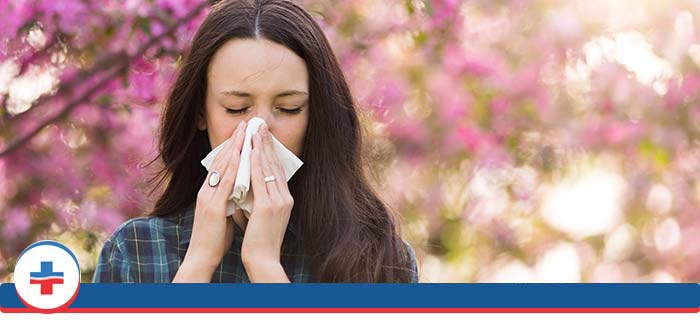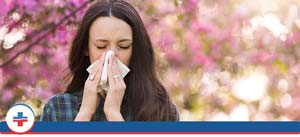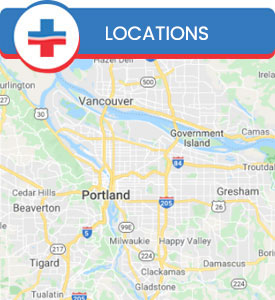Seasonal Allergies Treatment Clinic Q&A
Seasonal allergies can disrupt your routine if they get out of hand so come to Columbia Clinic Urgent Care and enjoy every season without allergies. For more information, please call us or request an appointment online. We have convenient locations to serve you in 82nd Avenue Portland OR, Stark Street Portland and Tigard OR.


Table of Contents:
How does a person know if they have seasonal allergies?
What months are seasonal allergies most common?
What are the best steps to take to treat seasonal allergies?
How do you know if it’s allergies or a cold?
Pollen is one of the most common outdoor allergens that trigger seasonal allergies or “hay fever.” An allergen is something that triggers an allergic reaction. Tree pollens, grass pollens, and weed pollens are the most common allergens. The pollen from insect-pollinated plants is too heavy to remain airborne for long, so allergic reactions are less likely to occur.
Hay fever is named after the hay-cutting season. Many people experienced symptoms during the summer months when this activity was most prevalent.
During the winter, seasonal allergies are less common, but allergic rhinitis can occur at any time. Pollen is released by a variety of plants at different times of the year. You could in fact experience hay fever in more than one season, but this is dependent on your allergy triggers and where you live. Mold or pet dander may also trigger an allergic reaction.
Seasonal allergy symptoms can vary from mild to severe. The most common symptoms include sneezing, watery or itchy eyes, runny or stuffy nose, ear congestion, itchy sinuses, throat, or ear canals, and postnasal drainage. Less common symptoms include wheezing, shortness of breath, headache, and coughing.
Seasonal allergies affect millions, particularly during the spring and summer months. According to the Centers for Disease Control and Prevention, 60 million Americans suffer from allergic rhinitis each year. Symptoms of nasal allergies include sneezing, runny nose, and congestion caused by your body’s overreaction to an allergen.
Often, seasonal allergies are triggered by pollen, which is spread in the air by plants during their reproductive cycle. Depending on where you live, there can be different types and amounts of pollen. Pollen can cause inflammation not only in the nose but also in the eyes. According to the CDC, seven out of ten people with nasal allergies (allergic rhinitis) will also experience itching and red or watery eyes. The culprits of springtime symptoms are likely to be trees, grass, and pollen.
Avoiding allergens that trigger symptoms for you is the best medicine for hay fever and year-round allergic rhinitis. Hay fever symptoms, according to healthcare professionals, can also be treated with medications. Alternative treatments are also used by some people.
Be aware of seasonal allergens and take steps to avoid them. Instead of using ceiling fans to cool your home in summer, use an air conditioner with a HEPA filter. Pollen forecasts can be found on your local weather network, and during high pollen counts, you should stay indoors.
Other treatment options are available, including over-the-counter decongestants and antihistamines, as well as prescription medications, such as steroid nasal sprays.
Your doctor may recommend allergy shots in severe cases. It helps your immune system become desensitized to allergens through immunotherapy.
In addition to slightly different symptoms, it is often as simple as noticing symptoms arise on a seasonal basis. The diagnosis of hay fever is usually easier than that of other allergies. If you experience allergic symptoms only during certain periods of the year, you may have seasonal allergic rhinitis. It may also be necessary for your doctor to check your ears, nose, and throat to make a diagnosis.
Testing for allergies is usually not necessary. It does not matter what type of allergen you react to, your treatment for allergic rhinitis will likely be the same.
Seasonal allergy diagnosis and treatment are available at Columbia Clinic Urgent Care, so reach out to us today. We are here to offer treatments for seasonal allergies. We serve patients from Portland OR, PDX, Tigard OR, Milwaukie OR, Cedar Hills OR, Cedar Mill OR, Lake Oswego OR, Oak Grove OR, Vancouver WA, Aloha OR, Minnehaha WA, Gladstone OR, Tualatin OR, West Linn OR, Fairview OR, Oregon City OR.


